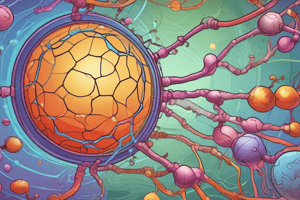Podcast
Questions and Answers
Which law governs biochemical energy conversions?
Which law governs biochemical energy conversions?
- First law of thermodynamics
- Second law of thermodynamics (correct)
- Law of conservation of mass
- Law of definite proportions
What provides energy for organisms through oxidation-reduction reactions?
What provides energy for organisms through oxidation-reduction reactions?
- Flow of positrons
- Flow of protons
- Flow of electrons (correct)
- Flow of neutrons
What does entropy, S, primarily signify?
What does entropy, S, primarily signify?
- Randomness and disorder (correct)
- Order and organization
- Molecular stability
- Energy potential
What is the equation for Gibbs free energy, G?
What is the equation for Gibbs free energy, G?
What do living cells invest to order subunits within biomolecules?
What do living cells invest to order subunits within biomolecules?
What state is maintained by organisms to achieve a constant composition?
What state is maintained by organisms to achieve a constant composition?
What provides the amount of energy capable of doing work during a reaction at constant temperature and pressure?
What provides the amount of energy capable of doing work during a reaction at constant temperature and pressure?
What do organisms transform from their surroundings?
What do organisms transform from their surroundings?
Which type of reactions provide energy for organisms?
Which type of reactions provide energy for organisms?
What does the second law of thermodynamics primarily address?
What does the second law of thermodynamics primarily address?
What does the constant composition within organisms result from?
What does the constant composition within organisms result from?
What provides the potential for energy to do work in a system?
What provides the potential for energy to do work in a system?
What is the equation for the change in Gibbs free energy, $\Delta G$, in terms of enthalpy, temperature, and entropy?
What is the equation for the change in Gibbs free energy, $\Delta G$, in terms of enthalpy, temperature, and entropy?
What does a negative value of $\Delta G$ indicate for a process?
What does a negative value of $\Delta G$ indicate for a process?
What is the primary significance of entropy, S, in a system?
What is the primary significance of entropy, S, in a system?
What measures the spontaneity of a reaction at standard conditions?
What measures the spontaneity of a reaction at standard conditions?
What is the high-energy compound involved in phosphoryl group transfers and ATP?
What is the high-energy compound involved in phosphoryl group transfers and ATP?
For hydrolysis reactions with large, negative free energy changes, why are the products more stable than the reactants?
For hydrolysis reactions with large, negative free energy changes, why are the products more stable than the reactants?
What is the enzyme that catalyzes the interconversion of adenine nucleotides (ATP, ADP, and AMP)?
What is the enzyme that catalyzes the interconversion of adenine nucleotides (ATP, ADP, and AMP)?
What is a potential phosphoryl group donor in living systems?
What is a potential phosphoryl group donor in living systems?
What process involves coupling highly exergonic reactions through phosphoryl group transfer potential?
What process involves coupling highly exergonic reactions through phosphoryl group transfer potential?
What is the primary significance of the magnitude of $\Delta G$ in a chemical reaction?
What is the primary significance of the magnitude of $\Delta G$ in a chemical reaction?
What is the energy change as the system moves from its initial state to equilibrium?
What is the energy change as the system moves from its initial state to equilibrium?




